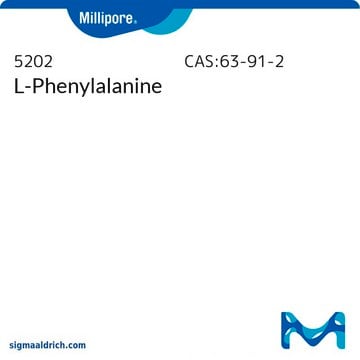P1150000
Phenylalanine
European Pharmacopoeia (EP) Reference Standard
Sinonimo/i:
L-Phenylalanine, (S)-2-Amino-3-phenylpropionic acid
About This Item
Prodotti consigliati
Grado
pharmaceutical primary standard
Famiglia di API
phenylalanine
Produttore/marchio commerciale
EDQM
Punto di fusione
270-275 °C (dec.) (lit.)
applicazioni
pharmaceutical (small molecule)
Formato
neat
Temperatura di conservazione
2-8°C
Stringa SMILE
N[C@@H](Cc1ccccc1)C(O)=O
InChI
1S/C9H11NO2/c10-8(9(11)12)6-7-4-2-1-3-5-7/h1-5,8H,6,10H2,(H,11,12)/t8-/m0/s1
COLNVLDHVKWLRT-QMMMGPOBSA-N
Cerchi prodotti simili? Visita Guida al confronto tra prodotti
Categorie correlate
Descrizione generale
Applicazioni
Confezionamento
Altre note
Prodotti correlati
Codice della classe di stoccaggio
11 - Combustible Solids
Classe di pericolosità dell'acqua (WGK)
WGK 1
Punto d’infiammabilità (°F)
Not applicable
Punto d’infiammabilità (°C)
Not applicable
Choose from one of the most recent versions:
Certificati d'analisi (COA)
Sorry, we don't have COAs for this product available online at this time.
If you need assistance, please contact Servizio Clienti
Possiedi già questo prodotto?
I documenti relativi ai prodotti acquistati recentemente sono disponibili nell’Archivio dei documenti.
I clienti hanno visto anche
Il team dei nostri ricercatori vanta grande esperienza in tutte le aree della ricerca quali Life Science, scienza dei materiali, sintesi chimica, cromatografia, discipline analitiche, ecc..
Contatta l'Assistenza Tecnica.








